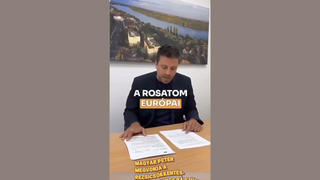
Will nine member states of European Union abolish Hungary's independent foreign and security policy? No, that's not true: A recently formed group of EU member states wants to change the way of decision making concerning EU's common Foreign and Security Policy. The current unanimity principle should be replaced by the application of qualified majority.
The claim originates from an interview with Viktor Orbán on 05th of May 2023 and appeared in a TikTok video (archived here) where it was published on the account of Zoltán Liszi on 15th of May. 2023. It opened:
Initiation of 9 EU countries: It shouldn't be possible for member states to have an independent foreign policy.
This is what the post looked like on TikTok at the time of writing:
(Source: TikTok screenshot taken on Wed May 17 17:10:53 2023 UTC)
Nine EU countries - Belgium, Finland, France, Germany, Italy, Luxembourg, Netherlands, Slovenia, and Spain - launched the Group of Friends to foster Qualified Majority Voting (QMV) in the EU's Common Foreign and Security Policy (CFSP) on 04th of May 2023. According to their statement, these countries do not want to suspend the independent foreign policy of any member states, they want to change the way how the member states decide on the EU's Common Foreign and Security Policy.
To make a decision in CFSP member states need so far a unanimous agreement, these nine countries want to change this to decisions with a qualified majority. The amendment would not mean that member states won't have the right to have an independent foreign policy.
Prime Minister Viktor Orban criticized the initiation in his interview with Radio Kossuth on the 05th of May 2023. He said:
To put it in concrete terms, today or tomorrow they will publish an initiative by nine countries, with Germany at the head of course - so there are not just anyone in this group! - who will be proposing that in future we should depart from the order laid down in the European Union's constitution and that the Member States should not be allowed to have an independent foreign policy. So, if the European Union decides, by a two-thirds majority, to take a decision on foreign policy, no Member State can opt out. This means that Hungary's independent foreign policy will be abolished. Today, European legislation guarantees that every country has the right to its own foreign policy, and a common foreign policy can only be established if there is complete unanimity on the matter in question. This is what they want to abolish.
Hungary frequently uses its vote to force the rest of the EU to make deals with Hungary. Foreign minister Peter Szijjarto just announced that Hungary will not support the new phase of the European Union military support for Ukraine nor any new sanctions against Russia until Ukraine removes Hungarian bank OTP from their list of war sponsors.














